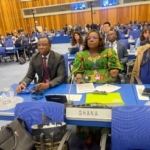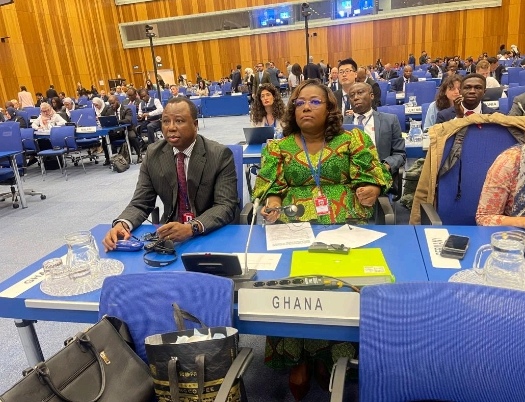
Nana Oye Bampoe Addo, Deputy Chief of Staff and head of Ghana’s Delegation, delivered landmark statements at the First Resumed Sixteenth Session of the United Nations Convention Against Corruption (UNCAC) Implementation Review Group (IRG) and the Open-Ended Intergovernmental Working Group on the Prevention of Corruption in Vienna on 16th June, 2025.
She outlined Ghana’s robust anti-corruption framework, citing the 1992 Constitution and key legislation like the Criminal Offences Act, Financial Intelligence Centre Act, Office of the Special Prosecutor Act, Whistleblower Act, and Witness Protection Act.
She also highlighted the National Anti-Corruption Action Plan (NACAP I & II), with NACAP II set for launch in September 2025, and the new “Operation Recover All Loot” (ORAL) initiative.
Ms Bampoe Addo reported tangible results: over $340,000 recovered by the Special Prosecutor, $11.5 million saved through blocked inflated contracts, and $1.55 billion recovered by the Audit Service from 2020 to 2023.
She emphasised citizen engagement, with over 15 million Ghanaians reached through sensitisation programmes, and announced the establishment of a Governance Advisory Council to oversee compliance and publish annual governance reports.
The government’s reforms include prohibiting political appointees from acquiring state assets, enacting the Conduct of Public Officers Bill, establishing special courts for corruption, and strengthening the Auditor-General’s powers.
She stressed Ghana’s commitment to financial integrity and anti-money laundering, noting digital reforms like the Ghana Electronic Procurement System (GHANEPS) and E-VAT, which have increased VAT revenue by 28%.
Ms Bampoe Addo concluded by inviting the international community to join Ghana’s anti-corruption fight, stating, “corruption has no place in Ghana’s future.”
The resumed process of the United Nations Convention Against Corruption (UNCAC) Implementation Review Group (IRG) and the Open-Ended Intergovernmental Working Group on the Prevention of Corruption aims to assess and strengthen the practical implementation of anti-corruption commitments among member states.
It provides a forum for countries to share progress, challenges, and best practices while also facilitating peer review and technical assistance to ensure that domestic laws and institutions align with international standards for preventing, detecting, and prosecuting corruption.
This process is designed to enhance transparency, accountability, and cooperation in the global fight against corruption.
Read More
